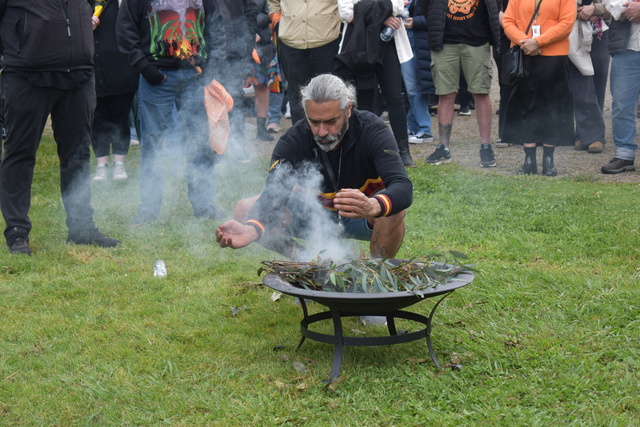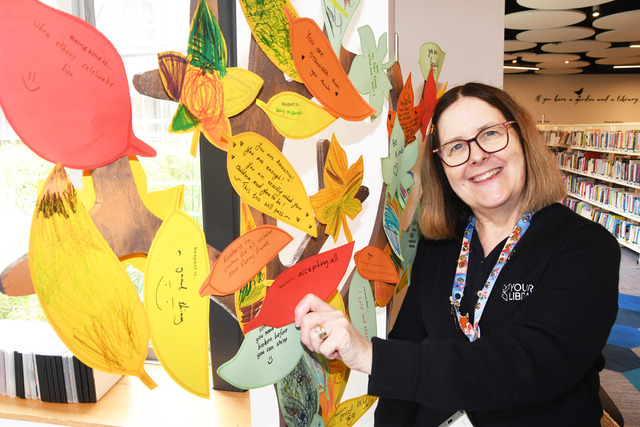A globally recognised competition, the Woorilla Poetry Prize celebrated another successful year in Emerald on Sunday 17 November.
Despite the challenging Melbourne weather, more than 60 people attended in person, with many more joining online from around the world.
One of the keys focuses of the Woorilla Poetry Prize is encouraging young voices, and Ms Millers has worked to ensure the competition remains accessible to all, particularly those from disadvantaged backgrounds.
The prize offers free entry to young poets, eliminating the financial barrier and encouraging them to share their work.
“We want to encourage young people to express themselves, especially those from backgrounds where it might be hard to find their voice,” Ms Millers said.
What began in 1989 as a small local initiative by Maria Millers has grown into an international celebration of poetry, attracting entries from across the globe – this year, poets from countries including the USA, China, Zambia, India and of course Australia participated, showcasing the competition’s expanding reach.
The ceremony highlighted the diverse voices in the poetry world, with winners announced across three categories.
The Junior Section, which is divided into two sub-categories, had a competitive field. The Youth Sub-Category for Culturally and Linguistically Diverse (CALD) poets, recognising young writers whose first language is not English, saw first prize awarded to Cloris Shi from Irvine, California, who received $300.
In the Louise Rockne Youth Section, named in honour of the late Louise Rochney, a passionate advocate for young poets, Cloris Shi claimed the top prize again, this time $300. Local poet Annie Zhou from Wheelers Hill was awarded second place with a $100 prize.
In the Judith Rodriguez Open Section, for poets aged 18 and over, the first-place prize of $3000 was awarded to Stephanie Powell from Brunswick East.
The runner-up was poet Rico Craig from Redfern, New South Wales, who received $500 for his poem ‘A Saturday in Nundah’.
This year’s judges included Poet Emilie Collyer, and an academic and a writer Gayelene Carbis – both of whom praised the high calibre of submissions.
The youth section judge remarked that this year’s competition was one of the most difficult she had ever judged, given the exceptional quality of the poetry.
Throughout the event, music played a key role in creating a vibrant atmosphere. Pianists Mark Gemmel and Pia Nivara performed, while attendees enjoyed a range of food provided by Millers’ family, which received much praise.
The event, while a competition, was more of a celebration of poetry, with the emphasis on providing creativity and connection among poets.
This year’s prize also drew attention to the global nature of the competition, with poets from Zambia, South Africa, China, the Philippines, Singapore, and Australia entering.
“It’s incredible to see how much the prize has grown over the years. What started as a small local competition has truly become a platform for young poets and established writers worldwide,” she said.
Looking ahead, Ms Millers is planning to introduce a new category in 2025, where poets will write in response to visual art, such as paintings or sculptures.
She also spoke of her vision for a broader poetry festival in Emerald, where poets of all kinds could come together for a weekend of performances and workshops. However, she acknowledged that such an event would require more support from local councils to become a reality.
“We’ve had incredible support from the community, but for events like this to thrive, we need more recognition from local councils,” she said.
The Woorilla Poetry Prize continues to be an important platform for poets worldwide, connecting voices from different cultures and backgrounds.
As Ms Millers put it, “Poetry has a unique power to bring people together, whether they’re in Emerald, California, or Zambia.”
With its growing impact, the prize is set to continue celebrating and supporting poetry for years to come.
Ms Millers said the event would not have been possible without the technical support of Phil Byers and Frank Leonard, Anna Millers’ hosting and organisation skills of Non Blair – who has been a driving force throughout.







